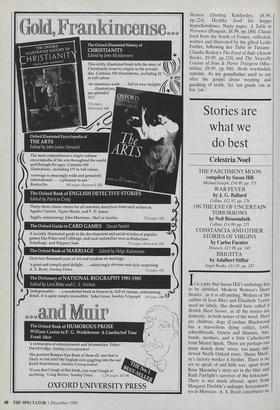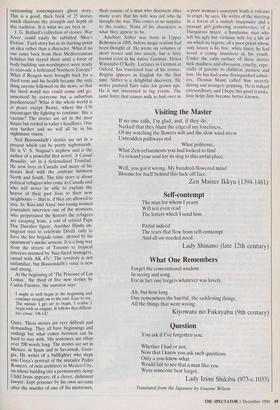Stories are what we do best
Celestria Noel
THE PARCHMENT MOON compiled by Susan Hill
Michael Joseph, £14.99, pp. 371
WAR FEVER by J. G. Ballard
Collins, £12.95, pp. 176
ON THE EVE OF UNCERTAIN TOMORROWS by Neil Bissoondath
Collins, £14.99, pp. 271
CONSTANCIA AND OTHER STORIES OF VIRGINS by Carlos Fuentes
Deutsch, £13.99, pp. 340
BRIGITTA by Adalbert Stiller
Angel Books, f13.95, pp. 247
It is a pity that Susan Hill's anthology has to be subtitled 'Modern Women's Short Stories', as it is off-putting. Writers of the calibre of Jean Rhys and Elizabeth Taylor need no labels. She should have called it British Short Stories, as all the stories are domestic, in both senses of the word. Here are children, dogs (Caroline Blackwood has a marvellous dying collie), food. schoolfriends, fatness and thinness, hus- bands, mothers, and a little Catholicism from Muriel Spark. There are perhaps too many dowdy dons' wives, too many mil- dewed North Oxford roses. Shena Mack- ay's factory worker is fresher. There is no sex to speak of and little war, apart from Rose Macaulay's story set in the blitz and Ruth Fairlight's survivor of the holocaust. There is not much abroad, apart from Margaret Drabble's unhappy honeymoon- ers in Morocco. A. S. Byatt contributes an
outstanding contemporary ghost story. This is a good, thick book of 25 stories which illustrate the strength and depth of this tradition. It is what we are best at.
J. G. Ballard's collection of stories, War Fever, could easily be subtitled 'Men's
Fiction'. Each story has as its starting-point an idea rather than a character. What if no one came back from their Mediterranean holidays but stayed there until a force of body-building sun-worshippers were ready to reinvade a federated Northern Europe? What if Reagan were brought back for a third term and his health became the only thing anyone followed on the news, so that the third world war could come and go, unnoticed by everyone but a suburban paediatrician? What if the whole world is at peace except Beirut, where the UN encourages the fighting to continue, like a vaccine? The stories are set in the near future but rooted in today's headlines. One step further and we will all he in his nightmare vision.
Neil Bissoondath's stories are set in a present which can be pretty nightmarish.
He is V. S. Naipaul's nephew and is the author of a powerful first novel, A Casual Brutality, set in a fictionalised Trinidad.
He now lives in Canada and many of his stories deal with the contrast between North and South. The title story is about political refugees who come to Canada and who will never be able to explain the horror of their past lives to their new neighbours — that is, if they are allowed to stay. In 'Kira and Anya' two young women Journalists interview one of the monsters who perpetrated the horrors the refugees are escaping from, a sort of retired Papa Doc Duvalier figure. Another Hindu im- migrant tries to celebrate Divali, only to have the fire brigade come, alerted by his apartment's smoke sensors. It is a long way from the streets of Toronto to tropical interiors manned by 'fuzz-faced teenagers, casual with AK 47s'. The territory is not unfamiliar, but Bissoondath's voice is new and strong. At the beginning of 'The Prisoner of Las Lomas', the third of five new stories by Carlos Fuentes, the narrator says:
I might as well begin at the beginning and continue straight on to the end. Easy to say. The minute I get set to begin, I realise I begin with an enigma. It follows that difficul- ties ensue. Oh f-k!
Quite. These stories are very difficult and demanding. They all have beginnings and endings but what comes between can be hard to stay with. His sentences are often over 200 words long. The stories are set in Mexico, in Spain and in Savannah, Geor- gia. He writes of a bullfighter who steps into Goya's portrait of the matador Pedro Romero; of twin architects in Mexico City, on whose building site a permanently damp Child Jesus appears; of a clever, dishonest lawyer, kept prisoner by his own servants after the murder of one of his mistresses, their cousin; of a man who discovers after many years that his wife was not who he thought she was. This comes as no surprise to the reader. None of his characters is what they appear to be.
Adalbert Stiffer was born in Upper Bohemia in 1805, before magic realism had been thought of. He wrote six volumes of short stories and two novels, but is little known even in his native German. Helen Watanabe-O'Kelly, Lecturer in German at Oxford, has translated four of his stories. Brigitta appears in English for the first time. Stifter is a delightful discovery. He writes pastoral fairy tales for grown ups. He is not interested in big events. The same force that causes milk to boil over in a poor woman's saucepan leads a volcano to erupt, he says. He writes of the meeting in a forest of a malade imaginaire and a peasant girl gathering strawberries; of a Hungarian major, a handsome man who left his ugly but virtuous wife for a life of sin which he regrets; of a poor priest whose only luxury is his fine, white linen: he had loved a young laundress in his youth. Under the calm surface of these stories lurk madness and obsession, cruelty, espe- cially of parents to children, passion and loss. He has had some distinguished admir- ers. Thomas Mann called him secretly daring and strangely gripping. He is indeed extraordinary and I hope this good transla- tion helps him become better known.











































































 Previous page
Previous page